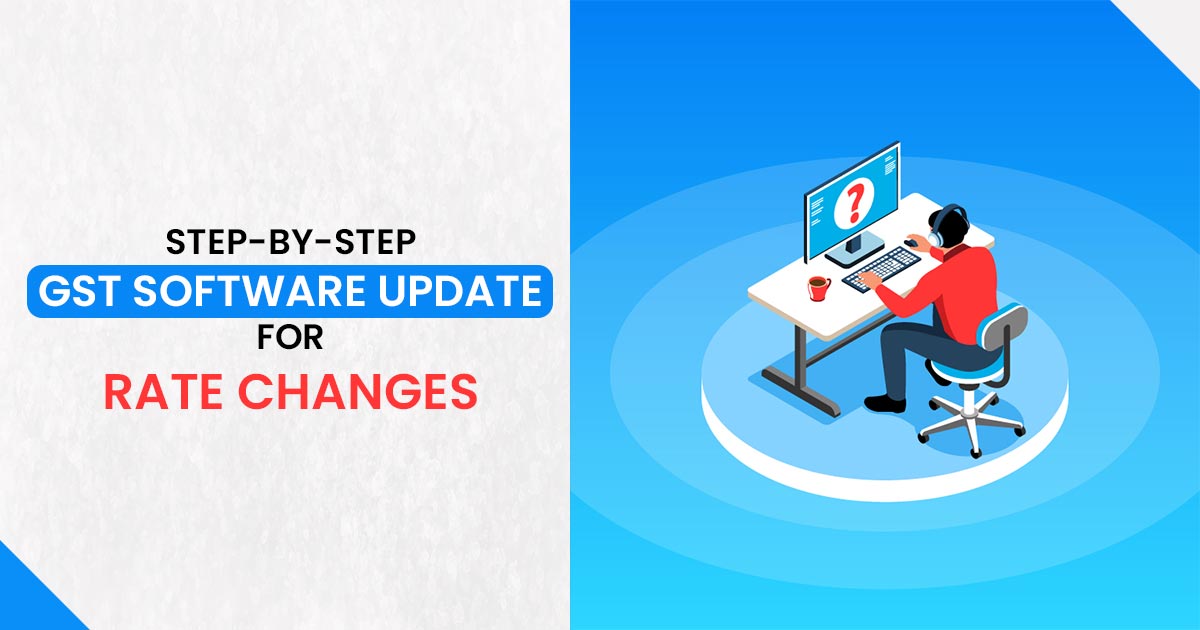
From 22 September 2025, the revised Goods and Services Tax (GST) rates will come into force, which were notified by the GST council, impacting businesses across sectors. GST-registered taxpayers who follow the updated rate must update their GST software.
This article offers a comprehensive guide using Gen GST Software as an example. It explains how to manage bulk updates, explains the rules regarding “time of supply,” and highlights exemptions related to life and health insurance policies.
Requirement to update your GST software
Businesses with the amended GST rates should ensure their invoicing, ledgers, and GST returns exhibit the appropriate tax rates. Compliance issues, penalties, and errors in Input Tax Credit (ITC) claims can take place if old rates are used.
Updating software is an important task. The revisions should be made at multiple levels: company, ledger, and item groups, to ensure precision across transactions.
A Guide to Updating GST Rates in Your Software
The renowned company SAG Infotech’s Gen GST online software is designed to help businesses effortlessly stay up-to-date with the latest GST rules and changes.
Whenever a new version is released, the software automatically updates all GST rates, rules, regulations, and official government announcements.
This ensures that your invoices, tax returns, and calculations are always accurate, saving you the hassle of manual updates and minimising the risk of errors.
Additionally, the software easily adapts to new requirements, such as changes in HSN codes and tax rates, making it a reliable and time-saving solution for businesses of all sizes.
Overview of GST Rate Revision
- Date of Implementation: September 22, 2025
- Nature of Change: Revised GST rates for multiple goods and services, aimed at simplification and removal of anomalies.
- GST Registration Threshold: No change; only rates are changed.
- Tax Rate Notifications: On the CBIC website, all official GST rate notifications are available.
Insurance Policies Exempt from GST
Life Insurance Policies: No GST will be charged on the term plans, endowment policies, and ULIPs. Reinsurance of these policies is also covered.
Health Insurance Policies: GST is exempted on the individual health insurance, including family floater and senior citizen plans. Reinsurance of these polices comes within the exemption.
GST rate revisions will come into force from September 22, 2025, and this is crucial compliance for businesses. To prevent compliance risks, wrong invoicing, and disputes in ITC claims, it is important to update the GST software like Gen GST, Tally, Zoho Books, QuickBooks, or SAP.
When taxpayers follow the above procedure, they can easily execute the updated GST rates and stay adherent to the rationalised structure.
Frequently Asked Questions (FAQs) on GST Rate Change
Q.1 – When will the updated GST rates come into force?
As per the suggestions of the GST council, the new rate will come into force from 22nd September 2025.
Q.2 – What takes place if goods were supplied before the rate change but invoiced later?
- The old rate will be applicable if the supply and payment were completed before September 22
- The new rate will be applicable if the supply was before, but the invoice/payment is after September 22
Q.3 – How are advances treated?
- The old rate will be applied if advances are received before September 22
- The new rate will be applied if advances are received on/after September 22
Q.4 – Do I need to reissue e-way bills for goods that are in transit?
No. Existing valid e-way bills remain valid even after the rate revision.
Q.5 – How will stock held before the rate change be treated?
Yes, The new rate will apply to any supply made on/after September 22, regardless of purchase date.
Q.6 – What happens to Input Tax Credit (ITC)?
- ITC on past purchases remains valid at the old rate
- No credit reduction will be there because of the change in the rate
Q.7 – What if my product becomes GST exempt under the updated regulations?
- Supplies which are made up to 21st September 2025 → ITC usable
- Supplies which are made on/after 22nd September 2025 → ITC needs to be reversed for exempt supplies
Q.8 – Will I get a refund for the accumulated ITC under the inverted duty structure?
If the difference emerges only because of the rate revision over time, no refund is given.